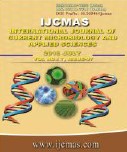


 National Academy of Agricultural Sciences (NAAS)
National Academy of Agricultural Sciences (NAAS)

|
PRINT ISSN : 2319-7692
Online ISSN : 2319-7706 Issues : 12 per year Publisher : Excellent Publishers Email : editorijcmas@gmail.com / submit@ijcmas.com Editor-in-chief: Dr.M.Prakash Index Copernicus ICV 2018: 95.39 NAAS RATING 2020: 5.38 |
Fodder crops are the plant species that are cultivated and harvested for feeding the animals in the form of forage, silage and hay. The average cultivated area in India under fodder production is only 4.4 % of the total cultivated area, but in Punjab, the situation is somewhat better with approximately 10 % of the total cultivated area under fodder crops which is not sufficient. There is urgent need to improve productivity of fodder and pasture lands by developing new fodder varieties and increased use of wasteland for fodder production. To improve the genetic potential of fodder crops required variability is not many a time available in the same species but has to be looked for in other species or genera. The genetic engineering/transgenics technology may be the remedy to above listed problems. Genetic engineering has greatly contributed to breakthroughs in plant improvement and led to the development of widely grown cultivars in major cash crops. The modern plant improvement technologies developed for genetic manipulation of various forage, turf and bioenergy species have opened up new opportunities for breeding these crops, which may help make them more valuable to cropping systems and hence more likely to become a component of them, bringing along their multifunctional benefits. By efficient incorporation of novel germplasm into applied breeding programmes, transgenic cultivars have the potential to play a critical role in fulfilling the increasing demand for animal products and renewable fuels in the 21st century.
 |
 |
 |
 |
 |